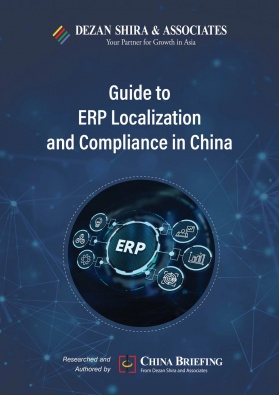China Monthly Tax Brief: November 2024
In this China Monthly Tax Brief for November 2024, we highlight significant taxation developments for businesses and individual taxpayers.
- The State Taxation Administration (STA) has decided to officially expand the fully digitalized electronic invoices nationwide starting December 1, 2024, following successful pilot programs.
- The State Taxation Administration (STA) and the Ministry of Finance (MOF) launched electronic invoices for aviation passenger transport starting December 1, 2024. Businesses are encouraged to promptly optimize their internal reimbursement processes and related mechanisms to adapt to this change.
- The 2024 updates to China’s strategic investment rules simplify entry for foreign investors in the A-share market by lowering shareholding thresholds, reducing lock-up periods, and expanding investment options, signaling a commitment to increased market openness and flexibility through these new measures.
- China has expanded its departure port tax refund policy to facilitate export enterprises’ tax refund operations.
- Starting December 1, 2024, the rebate rate for products such as refined oil, photovoltaic products, and batteries was reduced from 13 percent to 9 percent, while rebates for aluminum, copper, and certain oils and fats were eliminated.
- Starting on December 1, 2024, the confirmation process for annual individual income tax (IIT) special additional deductions begins. Individual taxpayers should promptly confirm the special additional deduction information through designated channels before the end of the month.
Fully digitalized electronic invoices officially expanded nationwide starting December 1
On November 24, the State Taxation Administration (STA) announced the official nationwide rollout of fully digitalized electronic invoices (e-fapiao) through its website. This decision follows the successful pilot program, which has been implemented smoothly across various regions. The pilot program has delivered notable achievements, including optimizing the business environment, improving administrative efficiency, and facilitating the digital transformation of the economy and society.
The nationwide rollout will take effect on December 1, 2024. According to the STA, digital invoices are classified as a type of “electronic invoice” under the Regulations on the Administration of Invoices of the People’s Republic of China and hold the same legal validity as traditional paper invoices. Unlike paper invoices, digital invoices exist solely in digital format and are issued as single-copy documents. Each digital invoice features a unique 20-digit number, structured to include the last two digits of the calendar year, a regional code for the provincial tax authority, a digit indicating the issuance channel, and a sequential code.
To support the rollout, the STA has established a nationally unified electronic invoice service platform. This platform will provide taxpayers with free services for issuing and managing digital invoices. Tax authorities will determine the invoice quotas available to each taxpayer based on factors such as tax risk level, tax credit rating, and actual business operations. These quotas will be subject to dynamic adjustments to ensure they align with the taxpayer’s circumstances.
After receiving the electronic invoice, if the recipient needs to use it for declaring and deducting input VAT, fuel consumption tax, applying for export tax rebates, handling tax refunds on behalf of others, or selecting fuel inventory, they should confirm the purpose through the digital tax account.
Key points of the STA announcement are summarized in the table below:
| Key Points of the STA Announcement on Fully Digitalized Electronic Invoices | |
| Key points | Details |
| Advantages of electronic invoices |
|
| Applicable business types for invoicing | Currently set for the following specific business types:
|
| Invoice quotas adjustment | Four dynamic adjustment methods, including:
|
| Invoice usage during VAT declaration period |
|
| Issuance of red-letter electronic invoices |
|
| Process for issuing red-letter invoices for taxpayers not using electronic invoices |
|
| Notes for issuing red-letter invoices through the electronic invoice service platform |
|
| Cancellation of electronic invoices |
|
| Filling out VAT and additional tax declaration forms |
|
| Invoice purpose confirmation |
|
| Correcting incorrect invoice purpose confirmation |
|
| Querying, downloading, and exporting electronic invoices |
|
| Reimbursement, accounting, and archiving |
|
Read more about fully digitalized e-fapiao, its impact, and how to prepare for it.
The promotion of fully digitalized electronic invoices for civil aviation passenger transport
On November 6, 2024, the State Taxation Administration announced the promotion of fully digitalized electronic invoices (e-fapiao) for civil aviation passenger transport. The announcement, made in collaboration with the Ministry of Finance (MOF) and the Civil Aviation Administration of China, will take effect on December 1, 2024. This announcement specifies that public air transport companies and registered air transport sales agencies in China are permitted to issue electronic invoices for domestic passenger transport services.
The electronic itinerary serves as a fully digitized invoice, containing essential information such as the invoice number, domestic and international identification, passenger ID details, itinerary information, fare, fuel surcharge, VAT amount and rate, and the Civil Aviation Development Fund. For travel dates prior to September 30, 2025, passengers can still use the original paper itinerary for reimbursement. However, it is important to note that paper itineraries, electronic itineraries, and other invoices cannot be issued multiple times.
| Key Points of Fully Digitalized Electronic Invoices for Civil Aviation Passenger Transport | |
| Scope | Domestic passenger transportation services are provided by public air transport enterprises and air transport sales agents registered in the country. |
| Rules and acquisition methods for electronic itinerary receipts | The electronic itinerary receipt is a fully digitalized electronic invoice, including invoice number, issuance status, passenger information, itinerary information, fare, taxes, etc. |
| The invoice number consists of 20 digits, including the last two digits of the year, administrative division code, issuance channel code, and business sequence code. | |
| Passengers can obtain the electronic itinerary receipt through the company’s website, mobile client, and other channels within 180 days after the end of the trip. | |
| Air transport enterprises or agents issue and deliver the electronic itinerary receipt based on passenger information. | |
| Reimbursement rule | Passengers need to obtain the electronic itinerary receipt or other invoices as required for reimbursement. |
| Until September 30, 2025, paper itinerary receipts can still be reimbursed but cannot be reissued. | |
| VAT handling | General VAT taxpayers determine the input tax amount based on the electronic itinerary receipt or VAT special invoice. |
| Until September 30, 2025, the input tax amount of paper itinerary receipts is determined according to the old regulations. | |
| General VAT taxpayers can confirm the purpose of the electronic itinerary receipt through the digital tax account and handle input tax deductions. | |
| Reissuing electronic itinerary receipts | If reissuing is needed due to information errors, a red-letter electronic itinerary receipt should be issued according to relevant regulations. |
| Information systems and data transmission | The maintenance unit of the electronic itinerary receipt information system uploads information to the tax authorities. |
| The tax authorities transmit the electronic itinerary receipt to the purchaser through the electronic invoice service platform. | |
DSA’s insights
The recent announcements regarding the promotion of fully digitalized electronic invoices in the railway passenger transportation sector highlight the government’s commitment to enhancing tax management efficiency and transparency through digital reforms. The close timing of these announcements reflects a consistent governmental effort in promoting electronic invoices, with reforms being simultaneously implemented in both the railway and civil aviation transportation sectors.
The widespread adoption of electronic invoices offers consumers a more convenient reimbursement experience, eliminating concerns about losing paper invoices. Consumers can easily obtain invoices through electronic channels such as mobile apps, significantly enhancing usability.
Both announcements have established transition periods. For instance, the civil aviation announcement specifies that paper itinerary receipts can still be used as reimbursement vouchers until September 30, 2025, providing a buffer period for consumers and businesses to adapt to the new system.
However, the promotion of electronic invoices may present adaptation challenges for consumers and businesses, necessitating appropriate training and guidance for employees. Additionally, information security and personal privacy protection are critical issues that must be addressed during the promotion process.
Foreign investors are presented with new strategic investment opportunities in Chinese-listed companies
On November 1, 2024, the Ministry of Commerce (MOFCOM) together with five other departments including the STA jointly issued the Administrative Measures for Strategic Investment by Foreign Investors in Listed Companies (hereinafter referred to as the “Measures”).
The Measures aim to promote high-level opening-up, attract and utilize foreign capital, improve the governance structure of listed companies, regulate the strategic investment behavior of foreign investors in listed companies, maintain order in the securities market, and protect the legitimate rights and interests of listed companies and their shareholders.
According to the Measures, foreign investors can make medium to long-term investments in listed companies through methods such as targeted issuance of new shares, agreement transfer, and tender offers. Foreign investors must comply with national laws and regulations, maintain order in the securities market, and avoid speculation and unfair competition. Additionally, foreign investors are prohibited from making strategic investments in listed companies in sectors restricted by the negative list for foreign investment access. Their investment activities must meet several conditions, including having substantial assets and not having faced major penalties in the past three years.
When making strategic investments, foreign investors are required to engage qualified intermediaries to conduct due diligence and provide professional opinions. Shares acquired through strategic investment cannot be transferred within 12 months from the date of acquisition unless specific conditions are met. Furthermore, foreign investors must comply with regulations on information disclosure, registration and settlement, foreign exchange management, and taxation, and undergo security reviews if their investments affect or may affect national security.
The Measures also outline the responsibilities of intermediaries, and legal liabilities for violations, and specify certain situations where the Measures do not apply, such as investments by qualified foreign institutional investors in listed companies.
The Measures will come into effect on December 2, 2024, replacing the old measures from 2005.
| Key Points of the New Measures | |
|---|---|
| Aspect | New measures |
| Facilitating strategic investment by foreign investors |
|
| Strengthening supervision and risk prevention |
|
| Applicability to NEEQ strategic investment |
|
| Regulatory rules for specific investment channels |
|
| Lock-up period regulations |
|
| Cancellation of Commerce Department approval |
|
Read more here: China’s New Measures Open A-Share Market to Foreign Investment
Expansion of departure port tax refund policy facilitating export enterprises’ tax refund operations
To further promote export trade, simplify the tax refund process, reduce corporate costs, and drive stable growth in foreign trade, the MOF, General Administration of Customs (GAC), and STA jointly issued the Notice on Expanding the Implementation Scope of the Departure Port Tax Refund Policy, which took effect on December 1, 2024, and will simultaneously repeal the previous pilot policy notice on land departure port tax refunds.
The following outlines the expanded scope and specific requirements of the departure port tax refund policy:
| Key Points of the Expanded Departure Port Tax Refund Policy | |
| Scope expansion | The policy’s scope is expanded from the original departure ports to more ports, and the departure ports specified in the relevant notices of the Guangdong-Hong Kong-Macao Greater Bay Area (GBA) can serve as transit ports. |
| Transport enterprises and tools | Specifies that the transport enterprises are China State Railway Group Co., Ltd. and its subsidiaries, and the transport tools are train sets or railway freight vehicles. |
| Conditions for export enterprises | Export enterprises must meet the first or second category of tax refund (exemption) classification management, be registered with customs, and not include discredited enterprises. |
| Detailed processing procedures | Provide detailed regulations for the entire process, from customs release at the departure location, electronic information transmission, tax refund application, tax authority processing of the refund, and verification after the actual departure of goods. |
DSA’s insights
We have observed that the scope of the departure port tax refund policy has been expanded, which is expected to provide tax relief for eligible enterprises, thereby reducing export costs. Companies should select eligible transportation methods and tools to fully utilize the tax refund policy. It is important to note that the export of hazardous materials is not covered by this tax refund policy.
Additionally, enterprises must be familiar with and strictly adhere to the tax refund processing procedures, pay attention to the updated list of departure ports, and leverage the flexibility of transit ports to optimize logistics arrangements. Companies should ensure compliance to avoid affecting their tax refund eligibility and promptly adjust their export strategies to adapt to policy changes, thereby effectively saving costs.
Adjustment of export tax refund policy: Changes in tax refund rates for various products and release of new tax refund rate database
The MOF and the STA have issued an Announcement on the Adjustment of Export Tax Rebate Policies (Caishui [2024] No. 15), declaring adjustments to the export tax refund policy effective from December 1. The policy cancels export tax refunds for products such as aluminum, copper, and chemically modified oils and fats of animal, vegetable, or microbial origin. Additionally, the export tax refund rate for certain refined oil products, photovoltaic products, batteries, and some non-metallic mineral products will be reduced from 13 percent to nine percent.
In accordance with the adjustments to the export tax refund rates, the State Taxation Administration has compiled the 2024C version of the export tax refund database. Export enterprises can apply to their respective tax authorities to obtain this database if needed.
Export tax rebates terminated
This adjustment cancels export tax rebates for aluminum products, copper products, and chemically modified oils and fats derived from animals, plants, or microorganisms, covering a total of 59 tariff items:
- Chemically modified oils and fats: These include non-edible oils and fats derived from animals, plants, or microorganisms.
- Copper products: A wide range of copper items such as bars, rods, profiles, wires, plates, sheets, strips, and foils.
- Aluminum products: Various aluminum items including hollow profiles, solid profiles, plates, sheets, strips, and foils.
- Other metals and materials: This includes specific alloys and composite materials.
A full list of products for which export tax rebates have been canceled can be found here.
Export tax rebates reduced
This adjustment reduces the export tax rebate rate from 13% to 9% for certain refined oil products, photovoltaic products, batteries, and some non-metallic mineral products, covering a total of 209 tariff items:
- Refined oil products: This includes various types of gasoline, diesel, and aviation kerosene.
- Photovoltaic products: Items such as solar cells and modules.
- Batteries: Different types of batteries used in various applications.
- Non-metallic mineral products: This category covers a variety of items, including certain types of graphite, silicon carbide, and other processed minerals.
A full list of products for which the export tax rebate rates have been reduced can be found here.
This policy shift aims to encourage domestic consumption and reduce export dependency, aligning with China’s broader economic goals. Businesses, particularly those in the metals and biofuels sectors, will face higher export costs, potentially reducing competitiveness and impacting global supply chains.
Read more here: Navigating China’s Latest Export Tax Rebate Adjustments: What Are the Implications?
Annual confirmation for China IIT special additional deductions starts on December 1
Starting on December 1, 2024, the confirmation process for annual individual income tax (IIT) special additional deductions begins. All individuals, including expatriates working in China, are advised to determine their eligibility for relevant special additional deductions. If eligible, individuals should promptly confirm the special additional deduction information through designated channels before the end of the month. Failing to confirm the IIT special additional deduction information may result in unnecessary difficulties in tax savings for the following year.
The special additional deductions cover seven types of expenses:
- Nursing expenses for children under three years old;
- Children’s education expenses;
- Continuing education expenses;
- Healthcare costs for serious illness;
- Housing loan interest;
- Expenses for supporting the elderly; and
- Housing rent.
Unlike the tax-exempt allowances/fringe benefits provided to foreigners in China, which can be reimbursed based on the actual cost of each expenditure, most special additional deductions (except for healthcare costs, which are deducted based on actual expense with a cap at RMB 80,000 a year) are deducted based on a standard basis—namely, on a fixed amount.
Read more here: Annual Confirmation for China IIT Special Additional Deductions Starts on December 1
About Us
China Briefing is one of five regional Asia Briefing publications, supported by Dezan Shira & Associates. For a complimentary subscription to China Briefing’s content products, please click here.
Dezan Shira & Associates assists foreign investors into China and has done so since 1992 through offices in Beijing, Tianjin, Dalian, Qingdao, Shanghai, Hangzhou, Ningbo, Suzhou, Guangzhou, Haikou, Zhongshan, Shenzhen, and Hong Kong. We also have offices in Vietnam, Indonesia, Singapore, United States, Germany, Italy, India, and Dubai (UAE) and partner firms assisting foreign investors in The Philippines, Malaysia, Thailand, Bangladesh, and Australia. For assistance in China, please contact the firm at china@dezshira.com or visit our website at www.dezshira.com.
- Previous Article China’s Workforce Dynamics and Regional Trends
- Next Article US-China Relations in the Biden Era: A Timeline

























